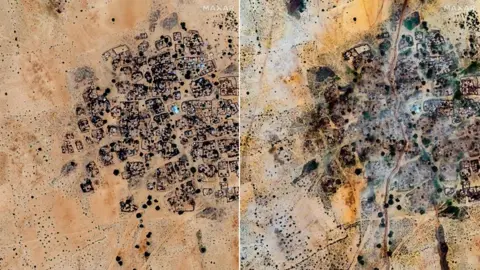The Acropolis in Athens has temporarily closed its doors on Tuesday as Greece grapples with extreme heat conditions. The iconic archaeological site ceased operations from 13:00 to 17:00 local time (11:00 to 15:00 BST) due to soaring temperatures, as announced by the country's culture ministry. The forecast indicated highs reaching up to 42°C (107°F) in various parts of Greece, prompting a Category 4 wildfire warning—a significant risk flag raised in multiple regions of the country.
This closure is a recurring measure, as the Acropolis had previously shut down during similar heat surges in June and July. The culture ministry noted that this decision was made to ensure the safety of both visitors and workers, as the site attracts approximately 4.5 million visitors annually.
In a corresponding move, Greece's labor ministry has mandated a five-hour work stoppage for outdoor manual laborers from noon to 17:00 in areas expected to experience the worst heat. The current heatwave is anticipated to persist into Wednesday, with temperatures ranging between 40°C and 42°C in southern regions, before gradually easing off by Thursday.
On a broader scale, Greece reported 41 wildfires that broke out on Monday, with 34 contained early while seven continued to pose threats into the evening. Late Monday night, the civil protection authority placed a Category 4 wildfire warning for five key regions: Attica, the Peloponnese, central Greece, Thessaly, and western Greece, urging residents to stay vigilant.
Internationally, parts of Europe, particularly France and Catalonia, have also been battling their own wildfire crises. Over 1,000 firefighters are combating a significant wildfire near Narbonne, France, leading to evacuations and road closures. Meanwhile, about 2,000 individuals in Catalonia are under lockdown due to a persistent wildfire ignited on Sunday in Tarragona.
The frequency and intensity of these heatwaves are on the rise, a trend attributed to human-induced climate change as outlined by the UN's Intergovernmental Panel on Climate Change. The panel warns that heatwaves will only become more common and severe as global temperatures continue to climb.
This closure is a recurring measure, as the Acropolis had previously shut down during similar heat surges in June and July. The culture ministry noted that this decision was made to ensure the safety of both visitors and workers, as the site attracts approximately 4.5 million visitors annually.
In a corresponding move, Greece's labor ministry has mandated a five-hour work stoppage for outdoor manual laborers from noon to 17:00 in areas expected to experience the worst heat. The current heatwave is anticipated to persist into Wednesday, with temperatures ranging between 40°C and 42°C in southern regions, before gradually easing off by Thursday.
On a broader scale, Greece reported 41 wildfires that broke out on Monday, with 34 contained early while seven continued to pose threats into the evening. Late Monday night, the civil protection authority placed a Category 4 wildfire warning for five key regions: Attica, the Peloponnese, central Greece, Thessaly, and western Greece, urging residents to stay vigilant.
Internationally, parts of Europe, particularly France and Catalonia, have also been battling their own wildfire crises. Over 1,000 firefighters are combating a significant wildfire near Narbonne, France, leading to evacuations and road closures. Meanwhile, about 2,000 individuals in Catalonia are under lockdown due to a persistent wildfire ignited on Sunday in Tarragona.
The frequency and intensity of these heatwaves are on the rise, a trend attributed to human-induced climate change as outlined by the UN's Intergovernmental Panel on Climate Change. The panel warns that heatwaves will only become more common and severe as global temperatures continue to climb.




















